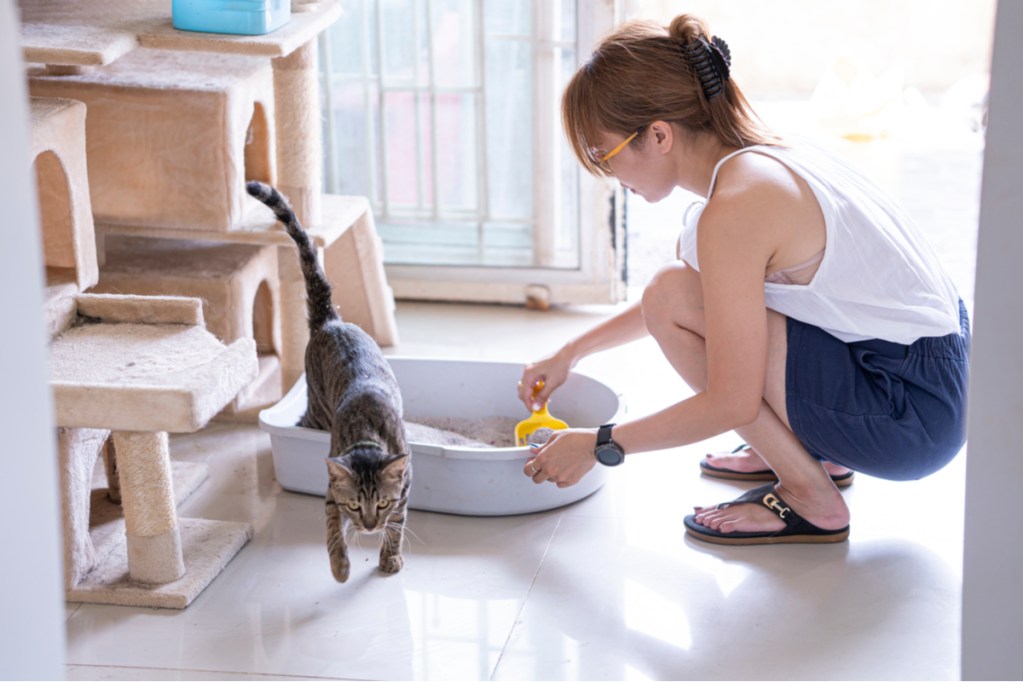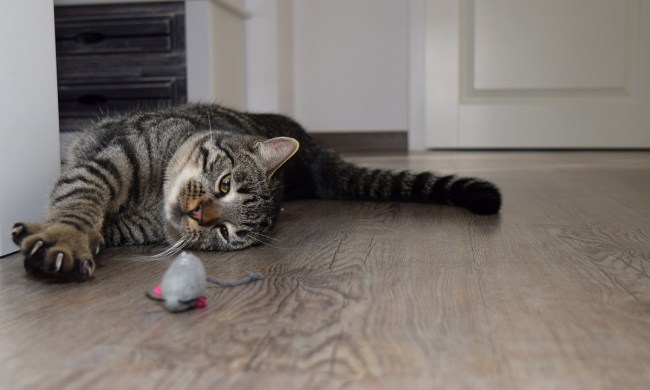No matter how much you adore your feline friends, there may come a time when all you want is to hide the signs of having a cat in the house. After all, you’d like for your guests to see your pet cat — not smell them! Whether it’s a well-used litter box or an incontinence issue that leaves lingering odors behind, getting rid of the smell of cat pee is a struggle that all cat owners can relate to. By the time you’re done cleaning, though, no one will have any clue what you’ve been dealing with.
There are many helpful strategies to help you tackle the smells and stains of cat pee, so read on to discover which tips and tricks will work best for your home. Learning how to get rid of cat pee smell is easier than you think!
Why does cat pee smell so bad?

Although cat urine can have a distinct ammonia-like scent, the chemicals and metabolic waste in their urine aren’t very different from other animals’. So why does it smell so bad? As difficult as it may be to hear, it’s important to realize that what you’re smelling isn’t just cat pee: it’s old cat pee. The smell is the result of a chemical reaction that happens as the urine sits on any surface.
“After a while, bacteria decompose the urea and give off an ammoniacal odor characteristic of stale old urine,” explained McGill University’s Office for Science and Society. “The second stage of the decomposition process emits mercaptans, compounds which also give skunk spray its nasty smell.”
Because cats tend to spray to mark their territory, small amounts of urine may be sitting out, gathering a smell, anywhere in the home. Even litter boxes can get stinky, so any cat owner could find themselves dealing with unwanted scents.
Do some cats have stronger scented urine than others?

Cat urine that’s been sitting out for a long time is bound to develop an odor, no matter how healthy and hygienic a cat is. Even so, some feline characteristics could make their urine more potent than others. It’s not your cat’s fault.
Older cats tend to have less efficient livers and kidneys, which can lead to the presence of more urea and metabolic waste in the urine. Unfortunately, this also leads to a greater smell. Male cats can also have this problem due to greater steroid and hormone levels in their bodies, but any number of illnesses could cause this issue, too.
How to get rid of cat pee smell

The first step to getting rid of that annoying cat pee smell is determining where it’s coming from. It could very well be coming from your cat’s litter box, but your cat may also be marking or urinating outside of their box. If your nose and eyes can’t lead you to the offending spot, McGill University recommends using an ultraviolet light to locate stains.
Cleaning new urine stains for odor control
If you can find a puddle or wet spot, you have a better chance of controlling your pet’s mess before odors have a chance to form. Begin by using a damp absorbent cloth to pick up as much excess moisture as possible. Be sure to use cold water to blot the stain, and never scrub or rub the cloth. You will just be grinding in the stain!
General stains
Your best bet in fighting feline odor is to use an enzymatic cleaner specifically meant for cat stains. These enzymes interrupt the chemical reactions that cause the offensive smell, but it’s not the only effective method for cleaning these messes and neutralizing odors. Catsan recommends a two-part cleaning, starting with vinegar, then a rinse, and then a diluted dish soap. You can also try a cleaning solution that’s half water and half vinegar (white vinegar or apple cider vinegar will do), though you’ll need to allow time for this to soak in.
Stains on delicate fabrics
If you’re cleaning a delicate fabric, like a sofa, you may want to try a gentler cleaning solution, such as baking soda and water. In fact, sprinkling baking soda on stains can be helpful no matter where the stain is. Cover the urine in baking soda, wait a while, then vacuum it up.
Old stains
For older stains that weren’t found until you smelled them, a vinegar and water solution is the most helpful tool. Use your usual pet-friendly household disinfectant to clean any surrounding items that may have been splashed or touched in the cleaning process.
Odor control for stinky litter boxes
If you have already tried increasing the frequency of your litter box cleanings, you may want to consider swapping litters altogether. Many cat litter types have odor-control technologies, but you wouldn’t want your home smelling like litter, either. Move the litter box to a well-ventilated area to stop the scents from lingering, or see whether an air purifier makes a difference for smaller spaces.
Of course, there are dozens of odor-eliminating products on the market that are safe for pets and pleasant in the home. It may take some trial and error to find what works best for your home, but once you find the right litter routine, you’ll be so glad you did.
It’s OK to feel overwhelmed by a smelly litter box or a few potent stains, but we hope this outline gave you a helpful idea of where to start looking for solutions. Your nose will thank you!




